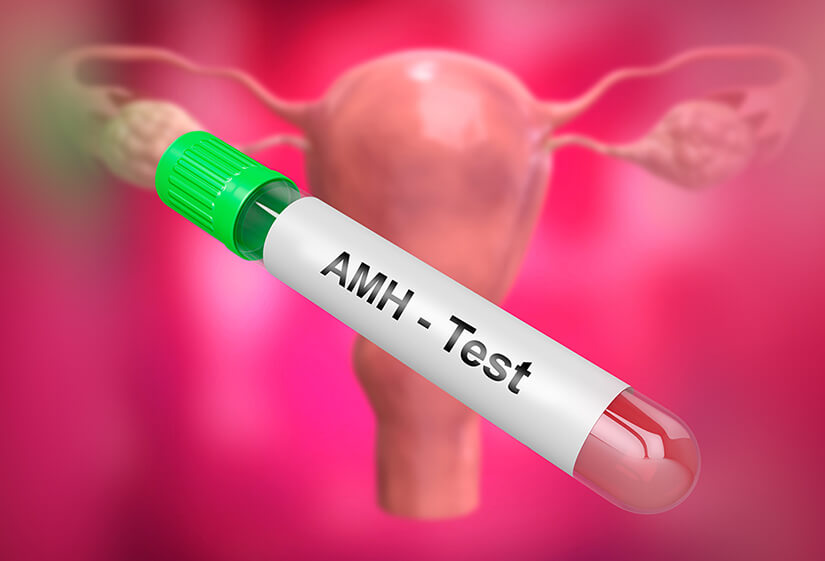What is a Good AMH Level for Pregnancy?
If you are on a treasure hunt, where the treasure is the family you’ve always dreamed of, then your map is a hormone called AMH.
This hormone, often surrounded by a cloud of confusion and anxiety, holds the key to understanding your fertility. But what does it truly mean? And how does it influence your journey to pregnancy?
Let’s, together, uncover the secrets behind AMH levels for pregnancy and their impact on your chances of conceiving.
AMH: The Fertility Marker
Anti-Müllerian Hormone (AMH) is a protein produced by the ovarian follicles. It serves as a marker of ovarian reserve, which means it gives an indication of how many eggs are left in your ovaries. Unlike other fertility tests that can fluctuate throughout your cycle, AMH levels remain relatively stable, making them a reliable indicator of your reproductive potential.
But what does an “AMH level for pregnancy” really signify? And how does it affect your ability to conceive, either naturally or with assisted reproductive technologies like IVF? To answer these questions, it’s crucial to understand the role AMH plays in the broader context of fertility.
What is Considered a Good AMH Level?
The interpretation of AMH levels can be tricky, but generally, the following ranges are used as a guideline:
- High AMH (>4.0 ng/mL): This level may indicate Polycystic Ovary Syndrome (PCOS), where a high number of eggs are present, but the quality might be compromised. Women with high AMH levels may have a good chance of getting pregnant, but they should be aware of the risk of ovarian hyperstimulation, especially during IVF.
- Normal AMH (1.0 – 4.0 ng/mL): This range is considered ideal for pregnancy. It suggests a healthy ovarian reserve and a good prognosis for both natural conception and IVF treatments.
- Low AMH (<1.0 ng/mL): Low AMH levels suggest a diminished ovarian reserve, which can make natural conception more challenging. However, it’s not the end of the road. Many women with low AMH still manage to conceive, either naturally or with the help of fertility treatments.
If you understand these ranges clearly, you can gauge your fertility potential. However, it’s important to remember that AMH is just one piece of the puzzle.
How AMH Levels Influence Your Fertility Journey?
When you’re trying to figure out how to get pregnant, knowing your AMH level is invaluable. It can guide decisions about when to start trying, whether to seek help sooner rather than later and what fertility treatments might be most effective.
For instance, if your AMH level is normal, you might have a wider window of opportunity for conception. But if it’s low, you might need to consider options like IVF sooner. Additionally, knowing your AMH level can help your IVF specialist in Delhi tailor a treatment plan that maximises your chances of success.
The Relationship Between AMH and IVF Success
For those considering IVF, AMH levels for pregnancy play a critical role in predicting how your ovaries will respond to stimulation. Here’s how:
- High AMH: Women with high AMH levels generally produce more eggs during IVF, which increases the chances of retrieving high-quality embryos. However, they may also be at risk for ovarian hyperstimulation syndrome (OHSS), a condition where the ovaries become swollen and painful.
- Normal AMH: This is the sweet spot for IVF. A normal AMH level typically indicates a good response to stimulation, with a balanced number of eggs retrieved, leading to higher chances of successful fertilisation and implantation.
- Low AMH: While a low AMH level might suggest fewer eggs will be retrieved, it doesn’t necessarily mean IVF won’t work. Many women with low AMH levels have successful IVF cycles, particularly when combined with other fertility treatments.
Beyond AMH Levels for Pregnancy: Other Factors Affecting Fertility
Fertility is influenced by many factors, including age, lifestyle, and overall reproductive health.
| Factor | Details |
| Age | – Age is a critical factor influencing fertility, as it directly impacts egg quality. |
| – Women with a normal AMH level may still experience reduced fertility as they age, particularly after 35, when the decline in egg quality accelerates. | |
| – As age increases, the chances of chromosomal abnormalities in eggs also rise, which can affect pregnancy success and increase miscarriage rates. | |
| Lifestyle Factors | |
| Diet | – A balanced diet rich in antioxidants, vitamins, and minerals supports overall reproductive health. |
| – Nutrient-dense foods like leafy greens, berries, nuts, and whole grains can enhance egg quality and improve your chances of getting pregnant. | |
| Exercise | – Regular, moderate exercise improves blood circulation to the reproductive organs, promoting hormonal balance and overall fertility. |
| – However, excessive exercise or extreme weight loss can negatively impact fertility by disrupting hormonal balance. | |
| Stress Management | – Chronic stress can lead to hormonal imbalances that may interfere with ovulation and conception. |
| – Stress management techniques like yoga, meditation, and mindfulness are essential in maintaining a healthy reproductive system, especially when trying to conceive. |
AMH as a Marker
- AMH is a valuable indicator of ovarian reserve, but it doesn’t predict the likelihood of conception.
- AMH levels give insights into the quantity of eggs but do not provide information about the quality of eggs, which is crucial for a successful pregnancy.
- It’s important to interpret AMH levels alongside other fertility assessments, as AMH alone cannot give a complete picture of your fertility potential.
IVF Specialist Consultation
- Working closely with an IVF specialist in Delhi is vital to interpreting your AMH levels in the context of your overall health.
- An expert can consider your age, lifestyle factors, and other health conditions to create a tailored fertility treatment plan that maximises your chances of a successful pregnancy.
- They can also help you understand the implications of your AMH level and guide you through options like IVF, lifestyle changes, or other fertility-enhancing treatments.
Can You Improve Your AMH Levels?
While AMH levels for pregnancy are largely determined by genetics, certain lifestyle changes may help optimise your ovarian reserve:
- Healthy Diet: Eating a balanced diet rich in antioxidants, healthy fats, and lean proteins can support overall reproductive health.
- Exercise: Regular moderate exercise can improve blood flow to the ovaries and support hormonal balance.
- Stress Management: Chronic stress can negatively impact fertility. Practices like yoga, meditation, and mindfulness can help manage stress levels.
Although these strategies may not significantly increase AMH levels, they can improve your overall reproductive health and enhance your chances of getting pregnant.
Taking Your Fertility Journey with Faith and Confidence
Understanding your AMH level for pregnancy is a vital step in your fertility journey. Whether you’re planning to conceive naturally or considering assisted reproductive technologies like IVF, knowing your AMH level can guide your decisions and help you make informed choices.
If you’re concerned about your AMH levels or your fertility in general, consulting an expert can make all the difference. Dr. Rhythm Gupta, a renowned IVF specialist in Delhi, offers personalised fertility assessments and treatment plans tailored to your unique needs. With her expertise, you can navigate your fertility journey with confidence and clarity. Schedule a consultation today to take the first step toward achieving your dream of parenthood.
FAQs About AMH Levels for Pregnancy
Yes, AMH levels can fluctuate but generally remain stable compared to other fertility hormones. However, significant changes over time may indicate shifts in ovarian reserve and should be monitored by a specialist.
Not necessarily. While a high AMH level indicates a good ovarian reserve, other factors, such as egg quality, sperm health, and uterine conditions, also play critical roles in pregnancy success.
While lifestyle changes may not drastically alter AMH levels, maintaining a healthy diet, regular exercise, and managing stress can improve overall reproductive health, which may positively impact your fertility.
AMH levels naturally decline with age, reflecting a decrease in ovarian reserve. This decline accelerates after the age of 35, making age a significant factor in fertility.
If you have low AMH levels, it’s important to consult with an IVF specialist in Delhi. They can recommend treatments like IVF with tailored protocols, egg freezing, or donor eggs, depending on your individual circumstances and fertility goals.












